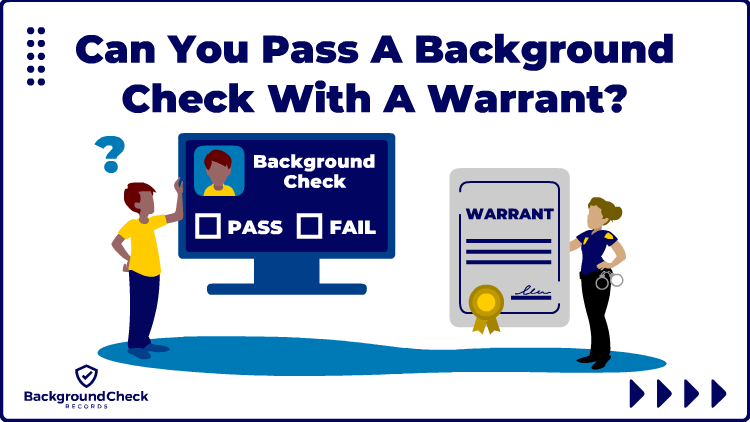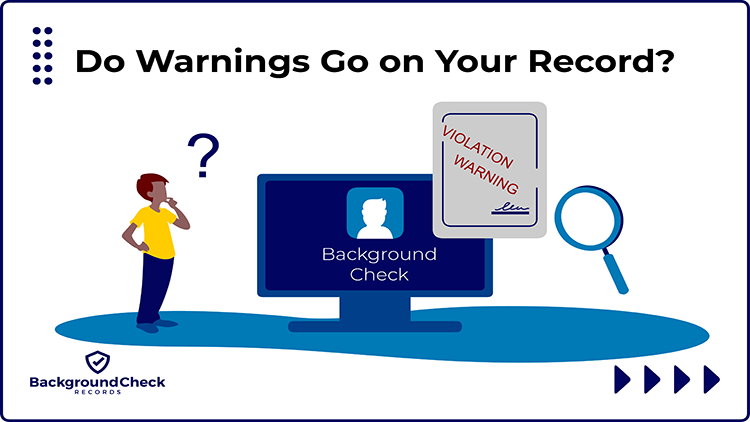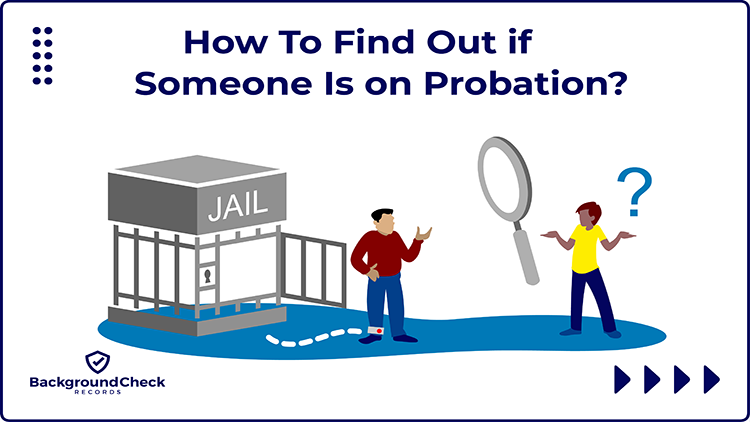Can You Pass a Background Check With a Warrant? (Good & Bad News)
In the United States, with over six million active warrants, many often inquire whether it’s possible to pass a background check with a warrant or if warrants are visible on background checks.
The good news is that warranted typically do not appear on criminal records checks until after they are executed, but there are exceptions.1 The bad news is, that some background checks are more in-depth than others, meaning warrants may appear on those particular screenings.
Regardless, there are steps someone can take to reduce the damage a warrant can do, and it’s important to resolve one quickly.
Understanding Warrants & Their Effect on Background Checks
Not all warrants are equal, and their effects on background checks can be as varied as the number of warrants. Some have greater potential to be discovered on even the most basic routine screenings, while others require more extensive searches. Still, others may never show up on a background check but can still have a profound effect on the person’s life and freedom. Knowing the types of warrants can help determine whether or not they will cause someone to fail a background check.
Types of Warrants and Whether They May Show Up on Background Checks
To understand how warrants can affect background checks, it’s important to know the different kinds of warrants. The type of background check plays a role in determining the impact a warrant has on the individual’s employment, security clearance, tenant agreement, or licensure matter. In essence, knowing more about warrants can help clarify whether it’s possible to pass a background check with a warrant.
There are three main types of warrants that may impact a person’s background check, but these are not the only types of warrants that can be issued.2 The end result of each is that the individual is taken into custody by law enforcement, but whether they show up on a background check varies.
To determine how a warrant will affect the subject, or if it can show up on a records check, begins with knowing what kind of warrant was issued. Pending charges are not the same as arrest warrants, and a search warrant is vastly different than an arrest warrant. Charges can also be filed without a warrant ever being issued.
Instead, a criminal summons is provided to the accused telling them to appear in court. It’s only after they fail to appear pursuant to a summons that a bench warrant will be issued. Arrest, bench, search, civil, and fugitive warrants are outlined below.
An arrest warrant is issued by a judge or magistrate when an individual is charged with a criminal offense. These warrants usually do not show up on background checks until after they are executed and the matter is placed on a court docket for hearing. Arrest warrants can be issued at any time in the investigative process. And are often issued against individuals who present a flight risk, the crime is a violent crime or the alleged offender has an extensive criminal history.
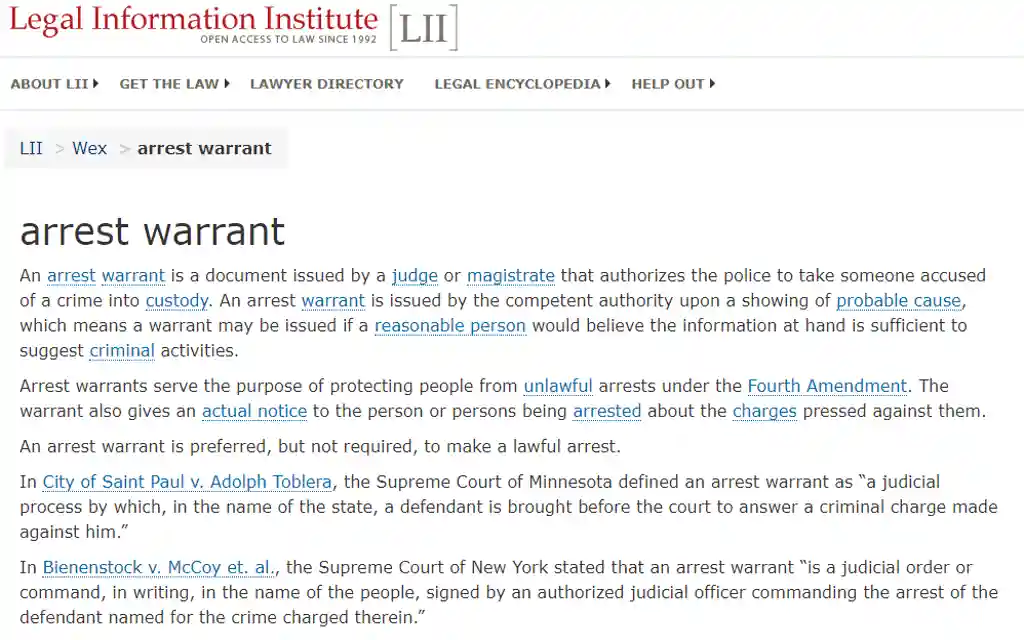
These can be either a misdemeanor warrant, for example, a DUI arrest warrant, or a felony warrant, for example following an indictment for murder.
A bench warrant is issued by a judge after court proceedings have started. These are usually issued when the subject fails to appear in court on existing criminal charges. Since bench warrants are issued in court as part of the trial process, they are included in the court record.
Court records can and do show up on background checks, so bench warrants can be part of routine screening. Probation warrants are an example of a bench warrant.
Search warrants are issued by a judge allowing law enforcement to enter the subject’s property to gather evidence of a crime. These warrants do not show up on background checks. States protect records of an investigative nature, so the accused will be unaware of a search warrant until it is served.
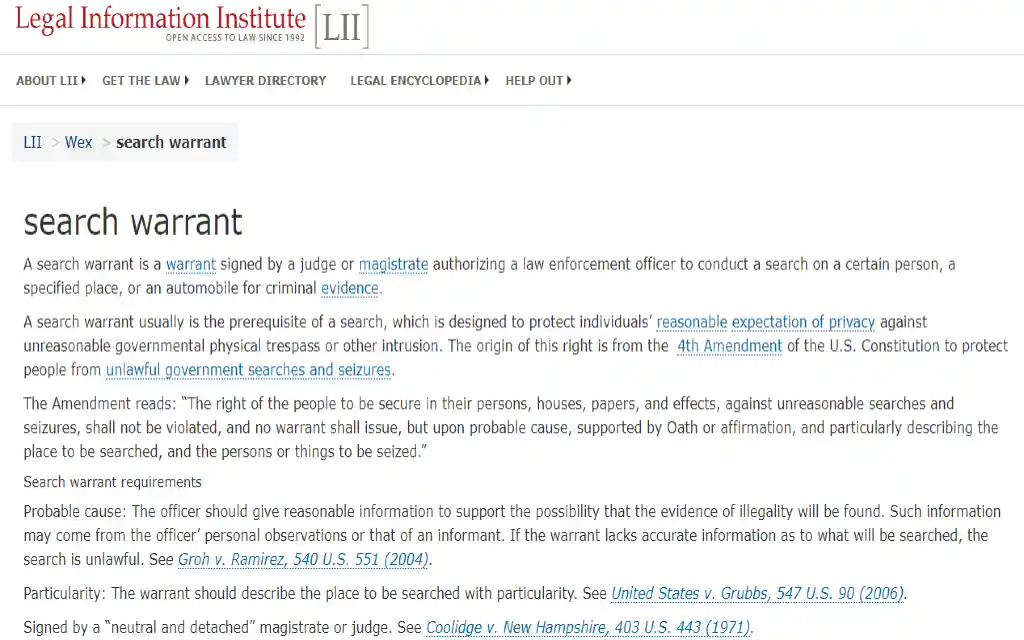
Civil warrants are issued by judges when a person fails to comply with some aspect of a court order such as child support obligation. Since these warrants are also part of a court record, they can and do sometimes appear on background checks. Civil warrants are usually issued for matters such as failure to comply with child support obligations.
Fugitive warrants are arrest warrants issued against someone who is making a conscious effort to evade capture by law enforcement. Unlike routine arrest warrants, fugitive warrants ensure cooperation between states when the alleged offender goes from one state to the other to elude capture.
Many of these individuals show up on state “most wanted” lists or portals online. These warrants can cause the subject to fail a background check if one is conducted.
What Laws Determine if Warrants Can Be Part of a Criminal Background Check? Do Arrest Warrants Show Up on Background Checks?
Of the three main types of warrants that can appear on a background check, there are several factors that determine whether or not they will show up. One factor is the law in the state where the warrant was issued.
Federal laws dictate the limitations on making federal warrants public records. State and federal laws about criminal record checks also outline how this information can be used when it does show up on a background check.
State Laws Regarding Background Checks (Is It Possible To Pass a Background Check With a Warrant From Out of State?)
Whether or not warrants can be part of background checks depends on the laws in the state where the warrant was issued. Statutes that regulate the use of arrest records on background checks can also apply to warrants, but this is not always the case.
The possibility of passing a background check with a warrant depends on the state the person lives in and the type of warrant.
Additionally, even in states where warrants can be public records, the decision to make them searchable online can be limited by the courts or law enforcement agencies. It’s important to know what the state law is to know if the warrant will negatively impact a background check.
Some state agencies that require licensure, and involve public safety or public health may conduct what is called an FBI background check. These include fingerprinting which is screened by the FBI and can show active warrants in the information returned. This can result in failing to pass a background check.
The table below lists the laws in each state that regulate public access to warrants.
| State Guidance Regarding Warrants as Part of Criminal History |
| State |
State Law or Policy |
| Alabama |
Citizens’ Right to Inspect Public Copy |
| Alaska |
Release and Use of Criminal Justice Info |
| Arizona |
Inspection of Public Records |
| Arkansas |
Section 3, Act 1653 |
| California |
California Public Records Act |
| Connecticut |
FOIA* Criminal Records |
| Delaware |
FOIA* |
| Florida |
Chapter 119.07 Inspection of Records |
| Georgia |
Open Records |
| Hawaii |
Ban the Box |
| Idaho |
Title 74, Chapter 1 |
| Illinois |
FOIA* |
| Indiana |
Public Records Act |
| Iowa |
Chapter 22, Examination of Public Records |
| Kansas |
(KORA) Kansas Open Records Act |
| Kentucky |
Open Records Act |
| Louisiana |
Public Records Law, RS 44:1-44:41 |
| Maine |
Your Right to Know |
| Maryland |
Maryland Public Information Act (PIA) |
| Massachusetts |
Mass. General Laws c.4 § 7, Chapter 26 |
| Michigan |
Freedom of Information Act, Act 442 |
| Minnesota |
Public Records Act, 15.17 Official Records |
| Mississippi |
Public Records Act of 1983 |
| Missouri |
Chapter 610 of the Revised Statutes of Missouri |
| Montana |
Annotated Code 2021, Chapter 6 |
| Nebraska |
Statute 84-712 |
| Nevada |
Chapter 239 Public Records |
| New Hampshire |
RSA Chapter 91-A |
| New Jersey |
PL201 Chapter 404 |
| New Mexico |
(IPRA) Inspection of Public Records |
| New York |
FOIL Article 6, Sections 84-90 |
| North Carolina |
Chapter 132, Public Records |
| North Dakota |
Open Records Statute Chapter 44-04 |
| Ohio |
Sunshine Law |
| Oklahoma |
Oklahoma Open Records Act |
| Oregon |
ORS 192.3143 |
| Pennsylvania |
Act of Feb. 14, 2008, P.L. 6, No. 3 |
| Rhode Island |
Chapter 2 Access to Public Records |
| South Carolina |
FOIA, Chapter 4 |
| South Dakota |
Open Government Public Records |
| Tennessee |
Tennessee Public Records ACT FAQs |
| Texas |
Open Government Public Information |
| Utah |
Title 63-G |
| Vermont |
Access to Public Records Act |
| Virginia |
FOIA* |
| Washington |
FOIA* |
| West Virginia |
Freedom of Information, Public Records |
| Wisconsin |
Public Records Laws |
| Wyoming |
Statutes 16-4-201 through 205 |
*Not to be confused with the federal Freedom of Information Act, these states have titled their public records act the same.
Not only do states have their own laws regarding the use of warrants on background checks, but they must also comply with federal laws.
Federal Laws Regarding Background Checks & Warrants
When it comes to federal laws and warrants, the Fair Chance to Compete Act places limits on what federal agencies can inquire about in the early stages of filling an open position.
The Fair Chance to Compete Act does give agencies the right to conduct a background check once a conditional offer of employment has been extended, and a warrant can show up at that stage. Whether it determines if a person passed or failed depends on the position applied for, the type of licensure or clearance required, and other factors.
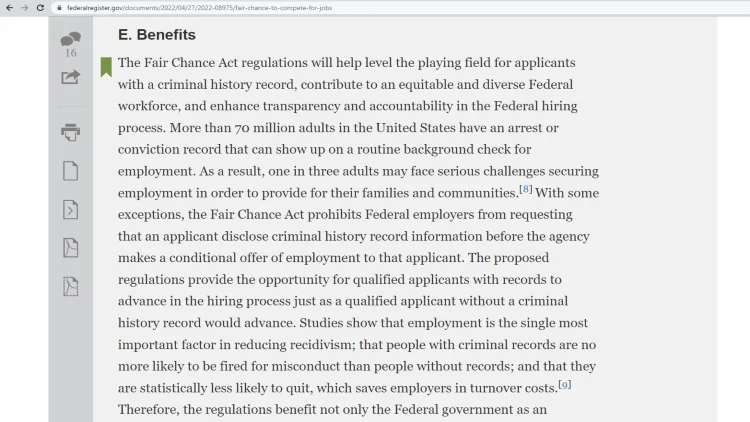
This background check, depending on the position and the requisite security clearance, can include fingerprinting which may show a warrant has been issued. This does not necessarily disqualify an applicant from employment. It is still possible to pass a federal background check with a warrant depending on the circumstances.
Federal jobs that require a fingerprint background check for security clearance, referred to as Level 2 checks, are much more extensive than a routine, or Level 1, background check. An active warrant can cause the subject to fail a Level 2 background check and be denied employment since these positions can sometimes involve national security. In most cases, warrants will flag on federal checks, but it doesn’t necessarily mean a person failed the background screening.
A warrant doesn’t necessarily prevent someone from getting gainful employment on the local, state, or federal level or with a private business but of course, an active warrant can create issues later on if not resolved.
Can Someone Get a Job with a Warrant?
Many jobs require a background check at some point in the hiring process, and it’s vital to know how a warrant may impact employment. If and when a warrant shows up on a background check is determined by the purpose of the screening and when it is conducted.
Pre-Employment Screenings
When most people think of an employment background check, they think of pre-screening. Many states have adopted “Ban the Box” laws that prohibit inquiring about arrests, criminal history, and warrants in the application stage of the hiring process.
Inquiries can be made later in the process before the individual is hired; however, most states limit the record to criminal convictions only. Since warrants are not convictions, it is possible to pass a pre-employment screening with an active warrant.
Some agencies and organizations not only use pre-employment screenings, but they may also utilize background checks of current employees.
Warrants and Continuous Background Screenings
A number of businesses, government agencies, and other organizations utilize continuous background screenings of current employees. These screenings are designed to give an ever-evolving picture of a person’s risk to the company or agency based on criminal history. Since warrants can turn up on pre-screening checks, it is logical they could also show up on continuous screenings.
As with pre-screening, it is possible to pass a continuous background check with a warrant depending on the type of screening conducted and how deeply the screener digs into someone’s record.
Until the warrant is resolved by being served or recalled, it still has the potential to impact the background check.
Do Recalled Warrants Show Up on Background Checks?
One way a warrant may not show up on any screenings is when it is recalled by a judge. Recalling a warrant cancels it making it no longer available for public scrutiny. Since it is no longer active, it should not impact a background screening. Only a judge can recall a warrant, so until this happens, any outstanding arrest warrants are considered active and public record.
Do Warrants Show Up on Tenant Screenings?
Warrants also have the potential to impact a tenant background screening; however, they are not as likely to show up as those for employment purposes. Prospective renters want to know if they can pass a background check with a warrant when they are trying to rent an apartment or house. The presence of a warrant can vary in its impact on tenant background screenings, often resulting in mixed outcomes when applying for rental properties.
Impact of Warrants on Tenant Screening
Landlords and rental agents conduct background checks on prospective tenants; however, these are not the same as employment background checks. Individuals renting out homes or apartments check for credit health, employment, rental history, and criminal record.4
Warrants may show up on these checks and when they do cause someone to fail the screening, the landlord or agent is required to notify the person in writing why they were denied the rental property per the Fair Credit Reporting Act (FCRA).
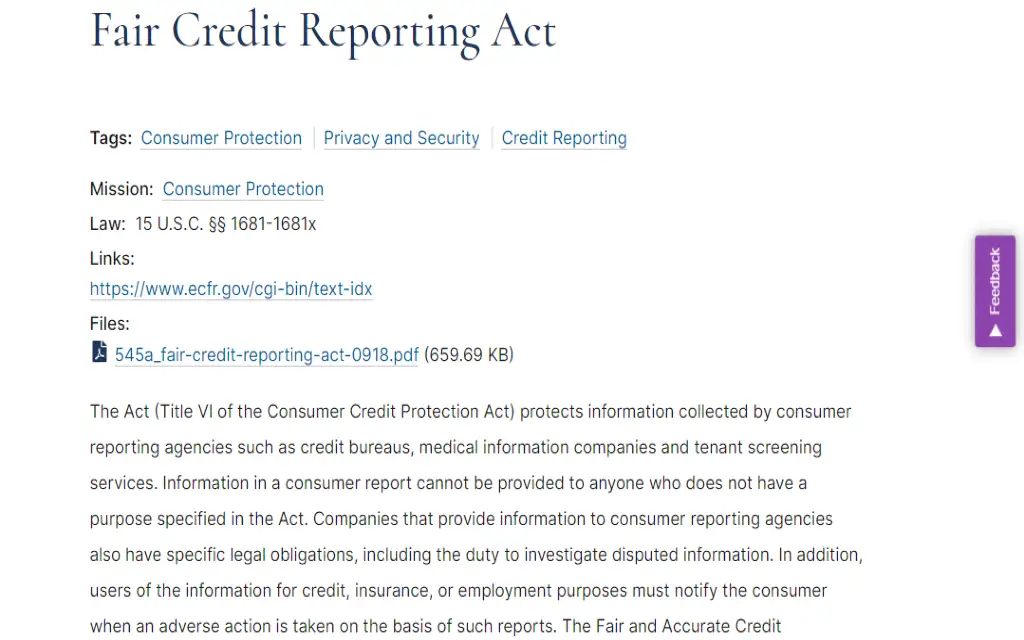
In short, a warrant can prevent someone from passing if the background check results reveal law enforcement is actively searching for the individual.
Related Reading: The time it takes to do an apartment background check.
What to Do if Someone Has an Active Warrant
When someone knows they have an active warrant it is best to resolve the issue as soon as possible by first verifying if they have a warrant, and then allocating legal assistance as discussed below. Even in criminal cases where the statute of limitations has expired, or the charges were dropped, if the warrant hasn’t been recalled it is still active and can negatively impact a background check and a person’s freedom.
Do Warrants Expire or Go Away?
The majority of the millions of arrest warrants in the United States stem from failing to appear on minor charges such as traffic violations or lesser misdemeanors and are often referred to as traffic warrants.5 These warrants do not simply expire or go away. They must be served or recalled by a judge in order to remove them from the court record.
Dropping or dismissing charges by a prosecutor or judge does not automatically cancel the warrant attached to the case. Charges that result in non-convictions include recalling warrants since the entire matter has been resolved in court.
How to Search for Active Warrants in Your State
When someone suspects they have an active warrant, they can conduct a search. Because an active warrant may cause the individual to fail a background check, when they suspect one is on the books, a quick, easy way to find out is to conduct a personal background check.
Warrants are generally considered public records in most states and individuals with active warrants are encouraged to turn themselves in. A person looking for active warrants, regardless of the state they are in, should begin the search at their local courthouse, police department, or county sheriff’s office. Some law enforcement agencies maintain online portals to search for warrants and encourage those with one to turn themselves in.
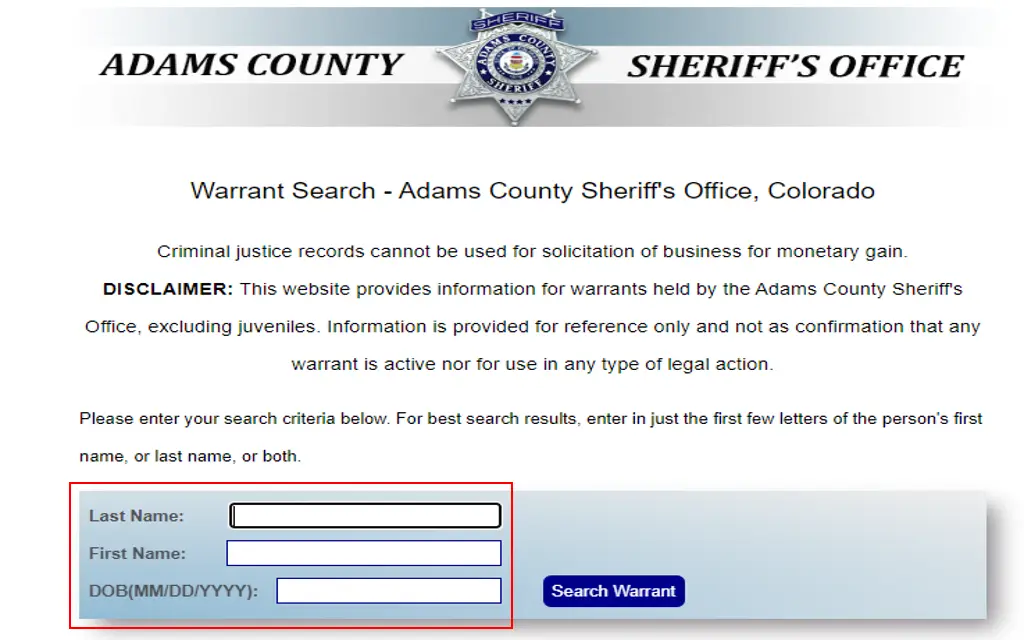
The table below has an example of an agency in each state that handles the dissemination of active warrant lists. In addition to state courts, federal courts can also issue warrants.
Federal Warrants
Federal law enforcement agencies also serve warrants on individuals for violation of federal statutes. These warrants also have the potential to appear on background checks. All federal warrants are maintained by the United States Marshal Service in its Warrant Information System (WIN). This is only available to law enforcement, not the public. Most individuals do not know there is an active federal warrant for their arrest until it is executed.
When it comes to warrants, the subject doesn’t want to leave anything to chance and should resolve the matter with the assistance of legal aid as quickly as possible. Because warrants in and of themselves can impact the person’s freedom, they should never try to settle the matter without professional assistance.
Using the Services of an Attorney or Bail Bondsman in Resolving a Warrant
When a person learns they do have an active warrant for their arrest, whether it was an arrest warrant, bench warrant, or civil warrant, in order to minimize the impact it may have on future background checks and their freedom, the person should reach out to an attorney or bail bondsman.
An attorney can help the individual turn themselves into law enforcement so the warrant can be served. Once the warrant is served, it is no longer active. The attorney can also appear in court to request bail or ask the person be released on their own recognizance, or what is called “signing themselves out of jail.”
Some states only make active warrants available to law enforcement and court officials (judges, attorneys, clerks of court), so an attorney’s assistance is invaluable in locating and resolving outstanding warrants.
A bail bondsman can also help an individual surrender and help post bail if a judge sets a bail amount. Bail bondsmen can also check to see if someone has an active warrant for their arrest.
Having an active warrant hanging over someone’s head can cause a number of headaches, but in summary, it may still be possible to pass a background check with a warrant.
Frequently Asked Questions
Are Warrants Automatically Recalled When Charges are Dropped?
Even when charges are dropped, warrants are not automatically recalled. When the warrant was issued for failure to appear, the individual will still have to appear before a judge to clear the matter. Additionally, arrest warrants attached to criminal charges should be recalled when the charges are dropped or dismissed, but sometimes they fall through the cracks. Arrests without conviction mean the warrant was served and is resolved negating the need to recall it.
Is There a Statute of Limitations for Serving a Warrant?
Warrants do not expire even when the statute of limitations for prosecuting the underlying crime has passed. Warrants are orders by a judge compelling someone to appear in court; therefore, they can only be resolved by appearing before a judge. When the statute of limitations on a crime has expired, but a warrant exists, the subject should hire an attorney to help resolve the matter.
1 Seidel, M., & Maxwell, M. (2020, February 11). Does a Warrant Show Up on a Background Check? Legal Beagle. Retrieved July 21, 2022, from <https://legalbeagle.com/13710149-does-a-warrant-show-up-on-a-background-check.html>
2 Gabriel, B. (2020, November 11). Do Arrest Warrants Show Up on Background Checks? The Law Office of Gabriel & Gabriel. Retrieved July 21, 2022, from <https://www.gabriellawteam.com/do-arrest-warrants-show-up-on-background-checks/>
3 Survey of State Criminal History Information Systems, 2018. (2020, November 5). Office of Justice Programs. Retrieved July 21, 2022, from <https://www.ojp.gov/pdffiles1/bjs/grants/255651.pdf>
4 Sato, G. (2021, April 29). What Do Landlords Look For in a Tenant? Experian. Retrieved July 21, 2022, from <https://www.experian.com/blogs/ask-experian/what-do-landlords-look-for-in-tenant/>
5 WANTED | Hundreds of thousands face warrants for minor offenses. (n.d.). USA TODAY NETWORK News. Retrieved July 21, 2022, from <https://stories.usatodaynetwork.com/warrants/wanted-hundreds-of-thousands-face-warrants-for-minor-offenses/>

